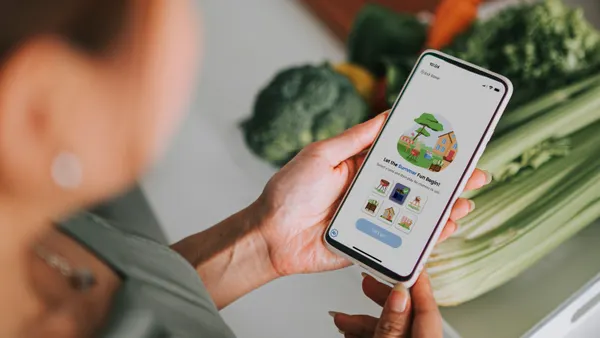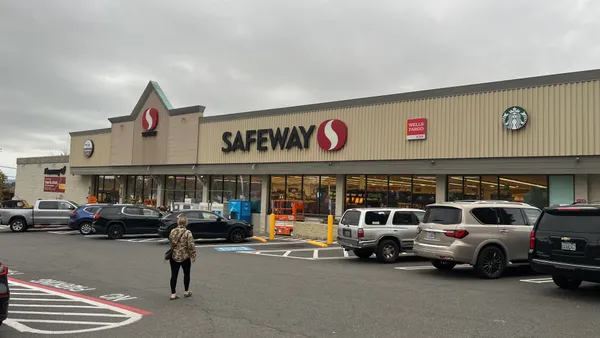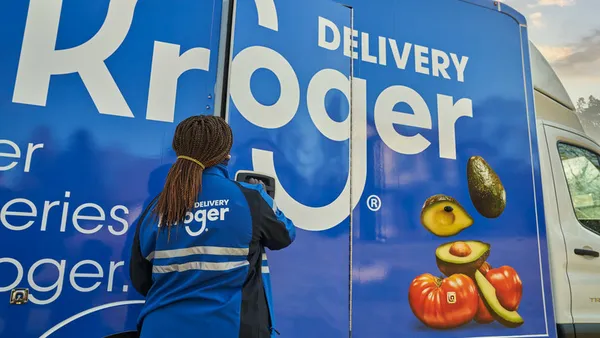Nestled among the golden hills of California, Oliver’s Markets has capitalized on its location by offering private label wines sourced from the famous Sonoma County wine country. Now, the grocer is looking to expand its private label selection by turning its attention to the South of France, Richard Williams, the company's wine buyer, said.
While the plans hit setbacks due to novel coronavirus pandemic and U.S. tariffs imposed this year on French goods, the grocer isn’t giving up its hopes of bringing exclusive French wine to its shelves.
“The hope is to have it up and running next year,” Williams wrote in an email.
Oliver’s is among a collection of grocers looking to ramp up their private label alcohol selection. A couple of factors, according to retail experts, make now the perfect time to pour more resources into the opportunity.
The grocery channel has seen alcohol sales boom during the pandemic as state and country restrictions continue to loosen up, allowing retailers to sell alcohol in areas where they weren't able to before. The pandemic-induced e-commerce boost and economic recession mean grocers are now reaching many price-conscious shoppers that private label usually targets.
Analysts at IRI and Rabobank said that private label makes up a very small percentage of an alcohol market that's driven by prestige labels and local favorites.
“Private label, in general, is very underdeveloped in alcohol. It's almost nonexistent in beer and spirits,” Brad Golden, senior vice president of insights at IRI, adding that beer and spirits tend to be more brand-driven and more closely tied to heritage and familiarity.
Oliver’s started to carve out space for its private label wine in 2015, and now its brand, Oliver’s Own, accounts for less than 1% of the category's SKUs with nine wine varieties available and two beers, Williams said.
In recent years, Target, Walmart and BJ’s Wholesale Club have raised a glass to private label wine. In January, Giant Food released a line of private label wines at 57 stores in Virginia. In October, Southern California grocery chain Gelson's Markets added four new wines to its own-brand collection.
“In wine, it's always been more of an exploratory category,” Stephen Rannekleiv, global sector strategist of beverages at Rabobank, said. “You walk into a wine shop or the wine aisle of any large grocer, it's easy to be a bit overwhelmed.”
He continued: “We've been hearing more from the winery side over the past few years that they're seeing market share being taken by private label, and private label [is] moving upscale into higher price points."
Toasting new opportunities
Still, several retail experts said they see chances for grocers to increase their forays into private label alcohol beyond wine. “Any well-developed private brand program will offer wine, beer and spirits,” Carol Spieckerman, president of retail consulting firm Spieckerman Retail, wrote in an email. “Lifestyle trends and packaging and formulation innovations will drive the business.”
Pennsylvania-based The Giant Company, for example, collaborates with local breweries on co-branded beer, donating a portion of the sales to local charities. “Co-branding would make sense for retailers seeking to overcome price resistance and bring credibility to higher-end offerings,” Spieckerman said, noting that most grocers want to fully own the brand to earn the credit for their creation and tie the product into the grocer’s overall branding strategy.
Grocers would do well to closely follow the latest alcohol trends, Spieckerman said, pointing to canned wines and cocktails and low-sugar and lower alcohol products as examples. Meanwhile, Rannekleiv said he expects grocers to consider hard seltzer and possibly non-alcoholic drinks, which are “generating a lot of interest,” but could require more time and resources to get right.
Aldi has already started to explore that space. In 2019, the grocer debuted its Vista Bay flavored hard seltzers after reviewing customer feedback, which also prompted the grocer to start offering premixed mimosas, Joan Kavanaugh, vice president of national buying services for Aldi US, wrote in an email. So far, both have been a hit, she said.
Oliver’s has talked about private label hard alcohol, Williams said, but is concerned about supply because most of the products are out of the Sonoma County sourcing range required for Oliver’s Own products.
For grocers venturing into the private label alcohol space, Rannekleiv suggests looking for suppliers that have experience developing brands long term, including private label brands; know relevant alcohol laws; and know how to target customers with the right flavor profiles.
While California’s famous Sonoma Valley plays a major role in the domestic wine industry, Rannekleiv said grocers are well-advised to look beyond domestic sourcing to find emerging opportunities with supply and pricing dynamics. “You may find that there are short-term opportunities out of Australia,” he gave as an example.
Traditional European suppliers are currently at a disadvantage following the U.S. imposing tariffs in 2019 on most wines from French, German, Spanish and U.K companies, and it’s uncertain what will happen with the tariffs once President-elect Joe Biden takes office next year.
Some grocers have already taken that step. Aldi, for example, works with more than 50 wineries around the world, from California to Tuscany, Kavanaugh said.
If interested in a test run, grocers should consider launching a private label for a limited time period, Rannekleiv said. An added incentive for the supplier would be to allow sales in markets where the retailer doesn't compete, he noted.
“If you’re going to take on private label, make sure you’ve got a plan in place for proper merchandising and make sure you think through where it’s going to sit on the shelf, how it’s going to be managed and who’s going to take care of it,” Rannekleiv said, pointing to grocers hiring sommeliers to help consumers or adding QR codes to share content with shoppers as examples.
Optimizing selection
Spieckerman says there’s a potential pitfall in private label for alcohol if grocers start to limit their selection of national and local brands to instead push their own brands. “Retailers have to really pay attention to the brand loyalty proposition and make sure that they're not cutting off options that their customers want,” she said.
On the other hand, especially in wine, grocers face the challenge of how to keep their customers from feeling overwhelmed by the sheer number of brands — national, local and own label — both in-store and online. Drinks, a direct-to-consumer wine service and platform partner for retailers, found an e-commerce solution: create “a dynamically generated store shelf for individual customers” by using consumer data to determine which labels will appeal to different customer demographics, co-founder and CEO Zac Brandenberg said.
Grocers are likely to couple low prices with quality for their private label offerings, Spieckerman said. Already, some like Albertsons and Aldi are touting their award-winning offerings as they look to compete with national brands.
“We've been hearing more from the winery side over the past few years that they're seeing market share being taken by private label, and private label [is] moving upscale into higher price points."
Stephen Rannekleiv
Global sector strategist of beverages, Rabobank
Price and positioning vary widely among grocers’ private label brands. Oliver’s, for example, has four pricing tiers for its Oliver’s Own wine, ranging from $8.99 to $12.99 with the Private Reserve Cabernet Sauvignon at $17.99. “We feel our wine and beer price points fit our demographic and with the exception of an opportunity like our Private Reserve Cabernet Sauvignon... this is where we want to stay,” Williams said.
Roughly 70% of Aldi stores carry alcohol, and private label alcohol makes up more than 80% of the grocer’s alcohol selection, Kavanaugh said. The grocer has seen sales of its private label wine and beer offerings increase in recent years, she said, declining to cite specific sales numbers. While Aldi offers private label alcohol at various price points, most of its wines sell for under $10, Kavanaugh said.
When it comes to branding, grocers mainly face two avenues in private label: going the way of Costco, which offers numerous alcohols under its Kirkland brand, or taking a quieter approach akin to Trader Joe's, where customers may not realize they’re buying private label alcohol.
For grocers that go the Costco route, there are opportunities to generate buzz around both the product and the brand. For example, Costco recently garnered attention for its giant Kirkland-branded alcohol, rolling out 1.75-liter, pre-bottled eggnog liqueur for $9.99 and 3-liter Prosecco bottles for $29.99 ahead of the holiday season.
Other grocers are taking a similar route of ramping up promotions for their private label alcohol this holiday season. Kavanaugh noted that several of Aldi’s Advent calendars this year are “alcohol focused” and include wine, beer, Vista Bay hard seltzer and sparkling wine options. Additionally, Aldi features a rotating monthly selection of Aldi Finds alcohol, leading to new product discovery for shoppers, she said.
However, grocers that don't have brands that are as well-established may find greater success in offering selections under multiple house brands in order to capture more purchasing dollars from exploratory shoppers.
“You're not going to be able to get all of your customers to just buy the one house brand. And that's where you wind up seeing retailers carrying multiple brands that are specific to them, because a customer is going to want to continue to try and having more enables that retailer to cover more of that wallet share,” Brandenberg said.
Correction: A previous version of this story identified The Giant Company by its former brand name.











